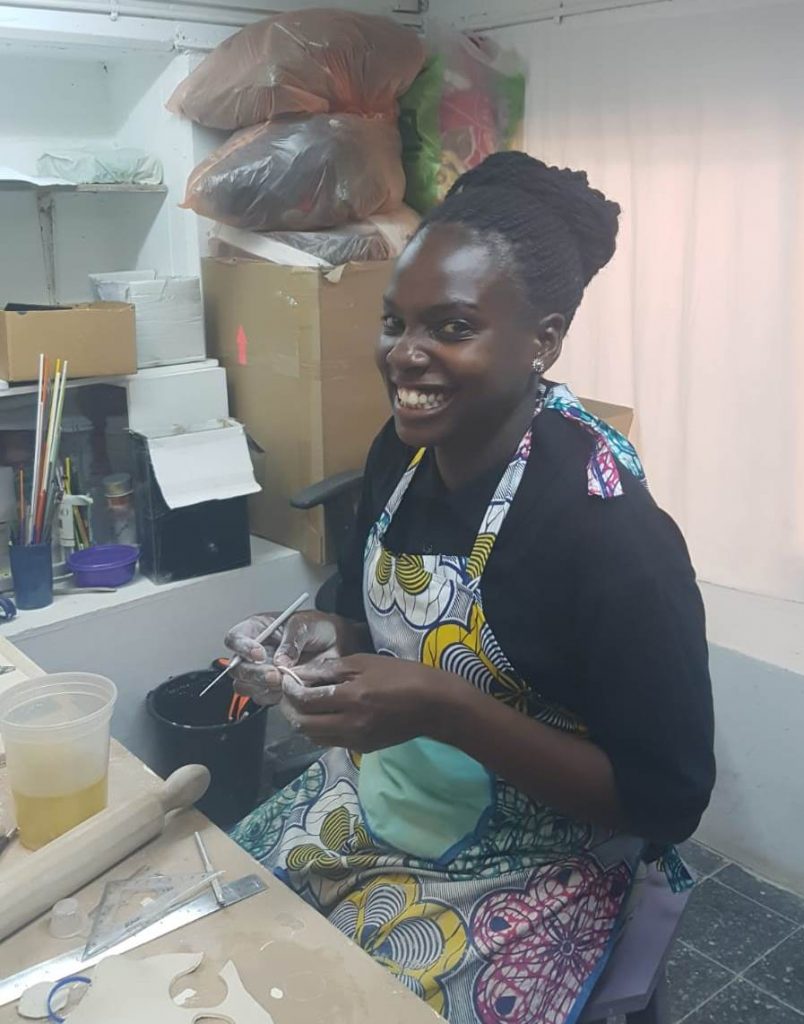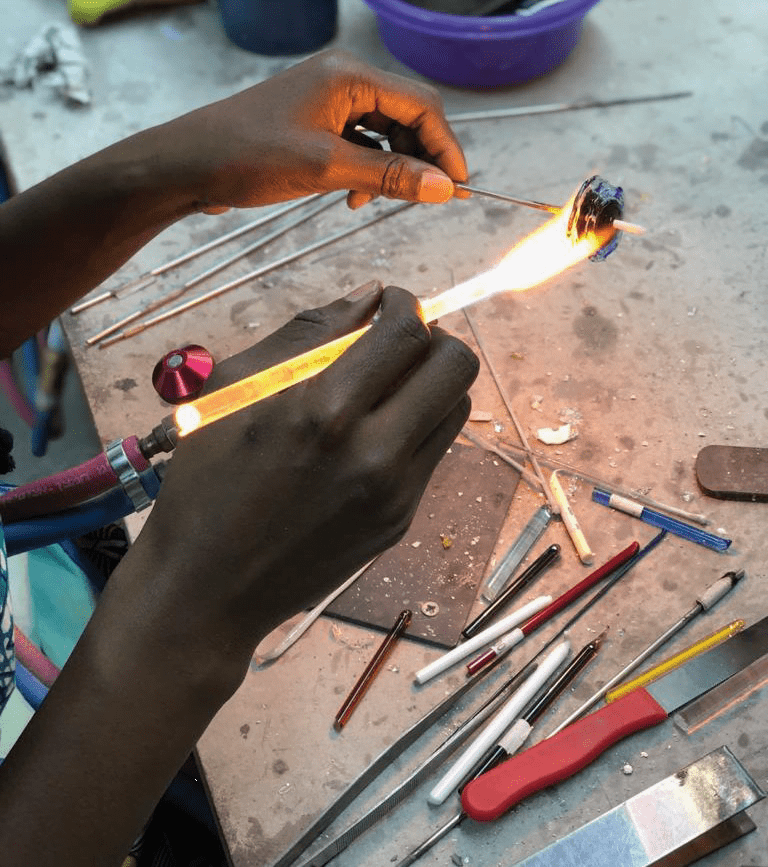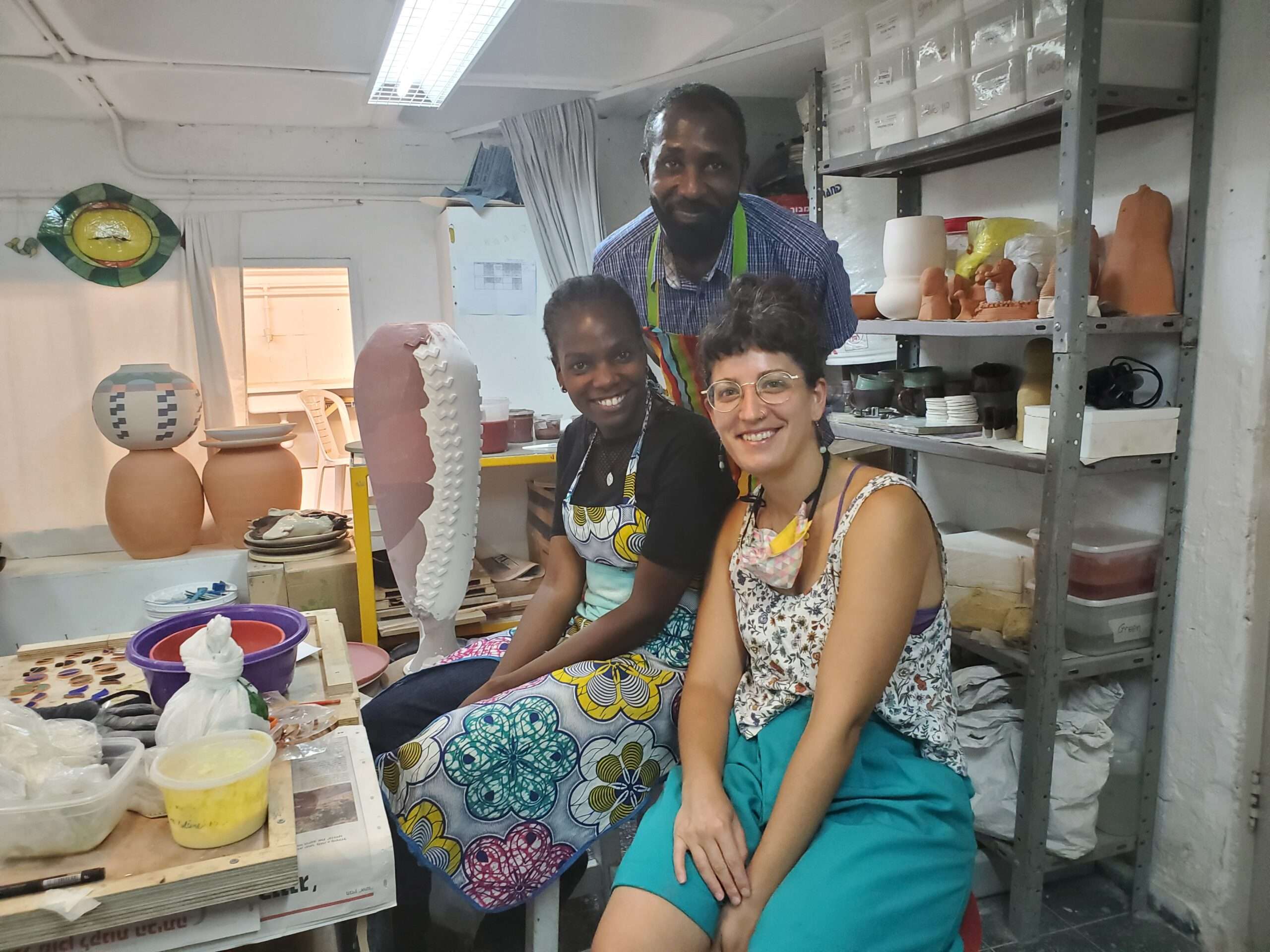By Lydia Schmelzer
Since 2018, the CoCuDi center has facilitated an exchange program between the Bezalel Academy in Jerusalem and Makerere University for arts students and faculty. The program is both an exchange of technical and scholarly knowledge, as well as one of cultural practices in a collaborative and communal setting. Starting in the fall of 2019, Bridget Nakayenga, a graduate student at Makerere University and glass artist, participated in the second year of the art academies exchange program. She spoke about her personal experiences as a participant in the exchange.
Bridget served as a teaching assistant (TA) at Bezalel Academy in the Ceramics and Glass Department and lived in the Hebrew University dorms in Jerusalem. She came to Bezalel with the intention of learning new techniques and expanding her knowledge of glass work, using technology unavailable to her at home in Uganda, while sharing her skills and knowledge to the Bezalel students and staff. As a TA, Bridget learned about and experimented with new types of glassmaking, alongside teaching students her own methods of glassmaking. At Makerere, Bridget focused solely on cold glass making such as mosaics and stained class. But at Bezalel, she broadened her knowledge of the medium. “At Bezalel, students are taught a broader view about glass making, they are taught hot glass making, which includes; Glass casting, Pate de vere and Lamp working among others, together with the cold glass working” she said. Bridget’s fellowship in Jerusalem piqued a newfound interest in hot glass making that she is still pursuing and gave her a better understanding of a material she has been working with for a long time. “I am working on how to put in practice the skills and techniques of art I learnt from the program and even develop them further” Bridget said.
Working at Bezalel and living in Jerusalem was eye opening in many other regards. In line with CoCuDi’s objective of cross-cultural dialogue, Bridget encountered differences between her life at home and Israeli culture. As a devout Catholic, Bridget had to adjust to the Israeli work schedule, wherein Sunday is a workday as opposed to Shabbat. Additionally, the academic environment at Bezalel was different from Makerere. “In Uganda, people in academia and all those older than you are supposed to be addressed by titles like; Sir, Madam, Mr, Mrs, Miss, Professor, among others. It is how we are trained culturally” Bridget commented. Yet, at Bezalel, faculty members were comfortable being addressed informally. Hebrew was also a challenge at the beginning. Most of the classes were in Hebrew and at times Bridget struggled to understand what was going on. Yet, “Interactions with students were great, they were very welcoming and were always ready to help where necessary and the faculty and every one there, was great. It was a lovely experience” she said. Often, fellow students would serve as interpreters for her, translating the Hebrew lesson into English for her in real time. Working alongside Israeli students and pursuing her own interests, Bridget made strong friendships with her peers at Bezalel. “I was so humbled to be warmly and lovingly welcomed by everyone that I met. It was indeed an amazing feeling” she said.
For the first half of the year, Bridget was exploring her craft, making friends and building a community in Jerusalem. However, in March 2020, the COVID-19 pandemic hit and her world turned upside down. Under lockdown, Bridget had to stay in her dorm room and could not work in the studio. Rather than learning in the workshop, Bridget had to find ways to work from home. She resourcefully began cutting recycled glass from her room to make jewelry and other items that she did not need a studio for. Quarantining in her room, Bridget was concerned for the health and safety of her family and friends back home. She was unable to fly back home and remained in Jerusalem for seven more months before she was finally able to go home in September. Despite the hardship of being on lockdown in a foreign country and not being able to pursue her passions to the fullest capacity, Bridget remained positive. She reflected on her time in lockdown, “I got to think about a lot that I had been taught, do a lot of research and get to understand the media of glass a lot better. It was during this time that our lecturers connected us to some of the great glass artists, which enabled me to get to know them, look at their work and see the possibility in working with the media of glass.” Even with the setbacks from the COVID-19 pandemic, Bridget still gained a lot from the experience. She left not only with new knowledge of her craft but also a deeper understanding and appreciation for Israeli culture.


